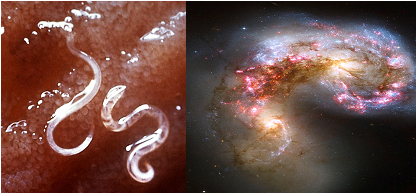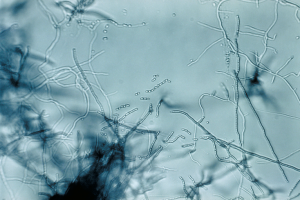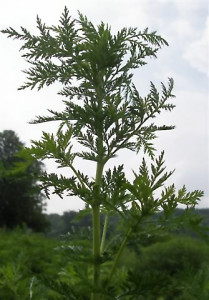
Parasitology may not be the most glamorous of scientific disciplines; roundworms do not grab the public’s attention in quite the same way as, for example, an image of a galaxy far far away – though they may share a similar shape (have a look at the image above). Despite this “drawback”, parasites have successfully insinuated themselves into all walks of life on Earth. And by ‘insinuated’ I mean they have been the bane of human and animal life as, by definition, parasites take from their hosts and leave behind death, disease and (socioecomic) destruction.
It is therefore not surprising then that the Nobel Prize has been awarded to several parasitologists over the years – the first being awarded to Ronald Ross in 1902 for his work on malaria – and that this year’s Prize recognises three scientists who have developed ‘parasite-fighting’ therapeutics.

Irish-born parasitologist Professor William C Campbell and Japanese biochemist Professor Satoshi Ōmura are recognised for their work on Avermectins and in particular Ivermectin. Avermectin compounds are derived from Streptomyces avermitilis – a bacterial species found typically in soil. Ivermectin is a broad-spectrum anti-parasitological compound that is a derivative of Avermectins and is used mainly in the treatment of river blindness, which is caused by the parasitic roundworm Onchocerca volvulus, and lymphatic filariasis. Globally, it is estimated that 25 million people are infected with O. volvulus and that 120 million people are at risk of infection (WHO), so this gives you an idea of how vital Ivermectin is.

At BugBitten, we have described the impact of malaria in several blogs recently, but its negative impact cannot be stressed enough. Therefore, Professor Youyou Tu’s discovery of Artemisinin and dihydroartemisinin to treat malaria thoroughly deserves recognition in the form of the Nobel Prize.
Artemisinins are derived from the sweet wormwood plant (Artemisia Annua) and are the most rapid acting drugs against Plasmodium falciparum malaria currently available. Sweet wormwood is not a stranger to medicine and has been used in traditional Chinese medicine to treat fevers for hundreds of years.
Youyou Tu also has the distinction of being the first Chinese scientist to be awarded a Nobel Prize in medicine.
Currently, the World Health Organization recommends both Ivermectin and Artemisinins (in the form of Artemisinin-combination therapy) for the treatment of river blindness and malaria respectively, showing that these compounds have become real, established and reliable therapeutics for two devastating parasitological diseases.
Finally, I leave you with the bizarre (in my opinion) fact that Austrian physician Julius Wagner-Jauregg was awarded the Nobel Prize in Physiology or Medicine in 1927 “for his discovery of the therapeutic value of malaria inoculation in the treatment of dementia paralytica”. The technique was called malariotherapy and involved inoculating Plasmodium vivax into patients suffering from syphilis. Despite some good results, the technique was discontinued because the risk of death was too high.

Comments